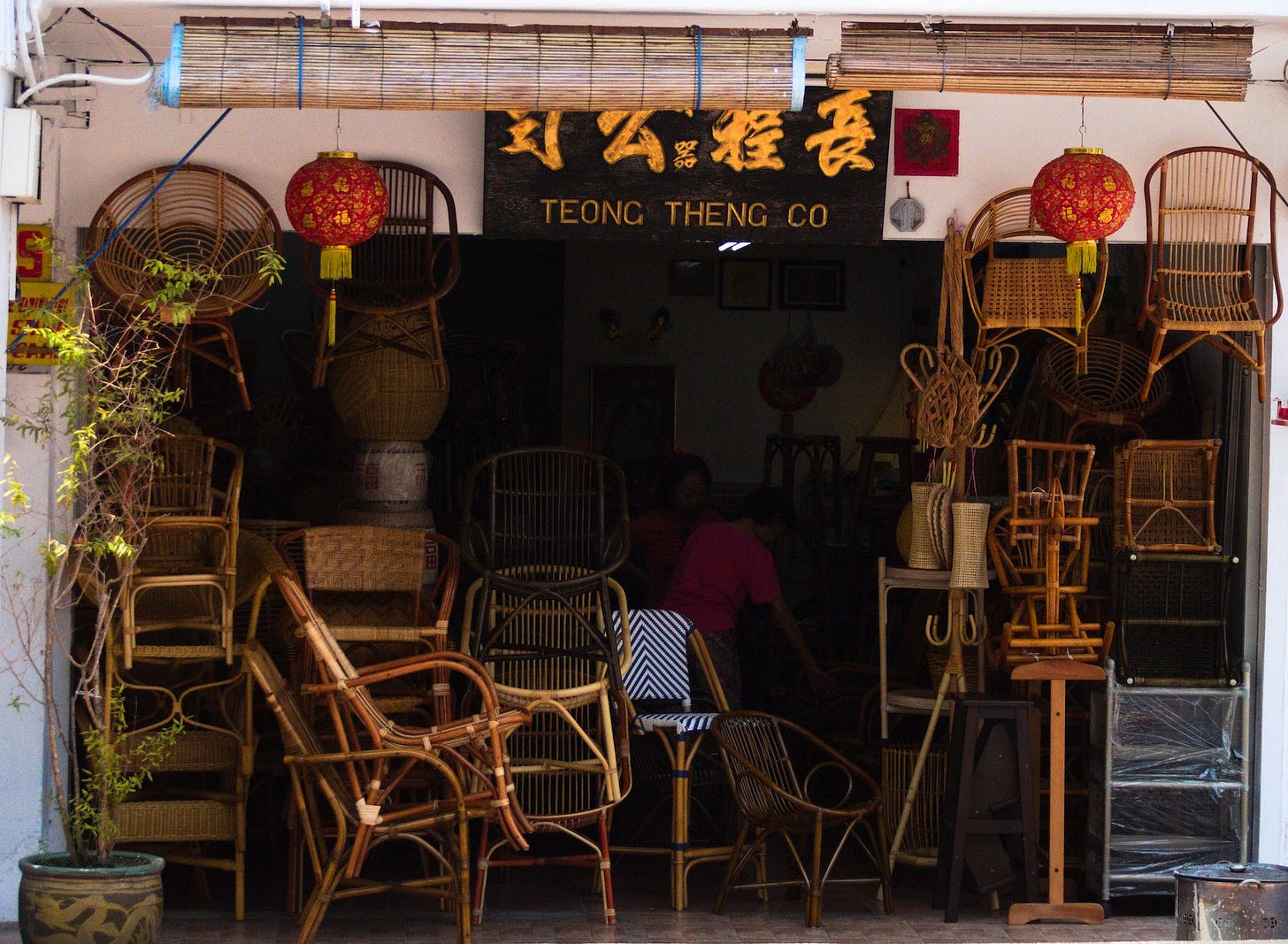Joo Chiat Road, the main shopping street where I live, is a good barometer for the expatification of Singapore: it literally measures pressure, as old-school hawkers and wicker chair shops get squeezed by tech-optimised coffee and free spirited cage-less pet hotels.
Then again, this kind of modernisation happens in big cities everywhere - as witness the late ‘90s gastration of old London pubs, where packets of pork scratchings and pints of bitter got replaced with freshly shucked oysters and pints of champagne, much to the despair of bitter traditionalists.
But there’s something especially galling about old Singapore caving in to the whims of an expat community who usually stay for only a few years and contribute little to the long-term fabric of the country and which I realise includes me.
Well, this particular expat is doing something about it: writing a Substack. Recoil in terror!
This is, of course, unlikely to halt the march of progress. What would actually make a difference is spending money in the wicker chair shop and at the old-school hawkers. But the populace of Joo Chiat is voting with their wallets: the queue at the shi-shi Japanese bakery (egg on toast: $14) snakes down the street while Poh Ho Restaurant (fried egg with hot-dog sausage: $1.00) closes down1.
Much the same happened to old London pubs. The trouble is that those despairing traditionalists forgot that most pubs were, to use the vernacular, a load of old pony2. Hence they remained desolate while champagne flowed in their upstart gastronomic rivals.
Another inconvenient reality about Joo Chiat’s recent history is that:
In the early 2000s, a proliferation of bars, hourly-rate hotels, karaoke lounges and massage parlours had appeared on Joo Chiat Road, giving the area a sleazy reputation.3
While prostitution is legal in Singapore, these venues were unlicensed. Apparently sleaze is acceptable only when officiated. Consequently, the Save Joo Chiat working group was formed to clean up the area, which led to increased policing and tighter restrictions on licensing, ultimately paving the way for new, more upmarket businesses to move in.
This regeneration accelerated after the pandemic because many of the sleaze-mongers went out of business during the lockdown, when social distancing somewhat compromised their business model. A few of them survived, however, especially at the northern end of Joo Chiat Road. They have curiously anodyne names like S-Box, Pebbles Pub and Web Pub. Some local businesses welcome the nightlife (and by implication the money comes with it)4 while more family-focused residents bewail the return of such dens of iniquity.5
It’s no surprise that there are opposing views, but perhaps expatification is less of a factor after all. Singaporeans are just as likely to want tech-optimised coffee as anyone else - or dens of iniquity, for that matter. Wicker furniture, maybe not so much. For now, some remnants of old Singapore are holding on, but it feels increasingly against the odds.
The despairing traditionalist in me still thinks it’s a crying shame that when the old places close down, a little bit of historic Singapore gets lost. But if the people really want free spirited cage-less pet hotels instead, I guess I’ll raise my pint of champagne to that.
https://mothership.sg/2022/08/poh-ho-restaurant-closed-down/
pony and trap = crap (cockney rhyming slang)
https://eresources.nlb.gov.sg/infopedia/articles/SIP_946__2008-11-13.html
https://www.todayonline.com/singapore/joo-chiat-got-covid-19-makeover-now-ktvs-are-coming-back-1871181
https://www.straitstimes.com/opinion/forum/letter-of-the-week-sad-to-see-rise-in-number-of-ktv-lounges-and-pubs-in-joo-chiat






